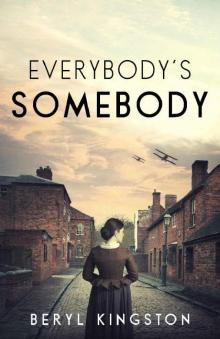- Home
- Beryl Kingston
A Time to Love Page 2
A Time to Love Read online
Page 2
Horrie was waiting for him, but the foreman hadn’t arrived. The relief of it made Emmanuel’s legs feel quite weak.
It was a long, cold, back-breaking shift, but it was a job and it would mean pay. He worked mechanically, straining under the weight of the baskets, his sweat as cold as he was, stopping now and then to cough the fog out of his lungs. A grudging daylight revealed that it was a real pea-souper, thick and greeny yellow, in which human forms were distorted into vague threatening shapes, hump-shouldered and faceless, glimpsed and gone, like creatures in a nightmare. Even their voices were changed, distanced and muffled by the pervasive murk, while the rattle of carts and trolleys and the scrape of boots and hooves were muffled too, as though the cobbles had been carpeted overnight. It is easy to be afraid, Emmanuel thought, when you are chilled to the bone and nothing is familiar. And he forced his mind to contemplate better and happier things.
At around eight o’clock there was a lull in the work and Horrie told his team that they could ‘cut off and get a bit a’ breakfast’ if they wanted, but Emmanuel had nothing to get a bit of breakfast with, so he stayed where he was, sitting on the edge of a discarded trolley and occupying himself with his thoughts.
He remembered the day the letter arrived from his uncle in Warsaw, and how happy he’d been to think that a marriage had been arranged for him, and that after sixteen years working in this foreign land and living in crowded boarding houses alone among so many lonely men he was to have a partner. He was thirty years old and at last he was to have a partner. And he relived the day she had arrived at Gravesend, looking so small and frail and shy and Polish, with her head and shoulders wrapped in a red shawl, and her spine bent in anxious self-effacement. He’d loved her at once, for her gentleness and meekness and because she was drooping like a flower in the heat, and because when she finally raised her head to look at him her eyes were brown and afraid. ‘I will care for you from now on, Rachel Rabinovits,’ he had promised. ‘I will be a good husband to you.’ And she had smiled at him shyly and held his arm as he led her away across the sticky cobbles. And finally he thought of the child that was coming, the family he was founding, life resuming in its old comforting pattern. Both his parents had been killed in the pogrom, before he and his two sisters fled to England, but life went on. It was a warming thought even in the thick of the fog.
But when the first rush of work was over and the porters sloped off through the murk to the nearest pubs and the eel and pie shops, and the donkeys were rewarded with nosebags and were soon chomping contentedly and much too audibly, he was so hungry and so fatigued that memories were no longer any sustenance at all. Horrie had told them to be back within the hour, so there was no possibility of walking home for bread and herrings, because he would never get back in time. There was nothing for it but to stay where he was and endure.
When the bay was empty and there was nobody left to see his shame, he picked over a pile of rotting carrots and found four that were almost good enough to eat, at least in parts. But they made a poor meal and after he’d chewed what he could of them his stomach was still yearning for more. He would have liked to return to the pile and find something else to assuage his awful hunger, but the scavengers had arrived in force and were turning over the debris like crows, and he simply couldn’t bear to be part of such degraded company. He might be poor and hungry, but he still had his pride.
He drifted away from the muddle of carts and baskets and discarded vegetables, glad that the fog had thinned a little and that now he could see to the other side of the road, and walked towards the Strand where the bustle of a busy thoroughfare would give him something to occupy his mind. He felt slightly sick and his stomach was strained with hunger.
He was rewarded by more activity than he expected. Something was going on, and in Trafalgar Square too, by the sound of things, for he could hear shouts and growls and hoarse cheers coming from that direction. Crowds of workmen were gathering outside Charing Cross Station and heading in small determined groups towards the square. He had nothing better to do, and he had to take his mind off his hunger somehow or other, so he followed them. He was curious to see what was happening. It might be a political meeting, it was true, and a gathering of that kind could be dangerous, but he decided to risk it.
It was a political meeting, and a very big one, complete with banners and men with loudspeakers standing on the fog-shrouded plinth of Nelson’s hidden column and booming incomprehensibly towards the ranks of white faces, damp caps and ragged coats below them. The fog was patchy here and Emmanuel could see that the crowd filled the entire space of the square, in dark shifting masses. Thousands and thousands of men, and more arriving by the minute.
Politics alarmed Emmanuel Cheifitz because they roused ugly emotions rather too quickly. But as the men nearest to him seemed to be in quite an amiable mood, at least for the present, and it would certainly be warmer inside such a crowd, he edged himself in and pretended to be listening. Even after seventeen years in the country he still found English an impossibly difficult language, especially when it was spoken quickly, or boomed through a loud-hailer, or argued passionately. But he did his best to concentrate and tried to ignore the fact that his belly was growling with hunger, and presently the word ‘hunger’ broke through both fogs and made sense to him.
‘No government ‘as the right,’ the speaker said, ‘to sentence ’onest workin’ men to ’unger an’ want an’ destitution. We ain’t criminals. We ain’t committed crimes. If there was work, wouldn’t we work?’
Agreement roared from every side. ‘Tha’s it! Work! Tha’s what we want!’ Determined roars, but not ugly yet, not dangerous.
But then a young man took the megaphone. A young man with a clear, strong, persuasive voice. And as he spoke, the atmosphere in the listening crowd changed and became sharper. ‘Our rulers don’t know how we feel, comrades. There they sit, all well fed and snug and smug in their gentlemen’s clubs, and they haven’t the faintest idea what it is to be hungry and desperate. They don’t know and they don’t care. There they sit, in their gentlemen’s clubs. In Pall Mall. A few yards away.’ He waved an arm towards Pall Mall. ‘And they don’t care. I will tell you what I think, comrades. I think we should leave this place. Nobody is listening to us here. We should leave this place now and march to Pall Mall and show them just how we feel. We should break their windows and beat down their doors and make them face us, man to man.’
Under the passion of his oratory the crowd seethed and shifted. Many were roaring approval, swaying towards him, faces lifted. Others were shouting him down and booing. Soon violent arguments were erupting on every side. The banner dipped forward and folded in upon itself and became a red arrow pointing the way, and a ragged column formed ready to follow it.
Time to move away from trouble, Emmanuel thought, for he knew from very early experience that men in a temper were just a little too quick to turn their wrath against the nearest Jew. Fortunately, his father had taught him how to handle this sort of situation, long ago, in Warsaw. He began to melt out of the crowd, quietly and unobtrusively, side-stepping and edging backwards so that he seemed to be facing the same way as everybody else, moving when others moved and careful never to look anyone in the eye. Becoming invisible. Staying safe. Soon there was a yard of sulphurous smoke and trodden snow between him and the nearest workman, and his heel had reached the kerb. He crossed the road quickly, head down, and went back to Covent Garden at once.
Rumours spread all through the afternoon. Thousands were said to be on the march. The West End was besieged. The police had been driven back and were powerless. Troops had been called out. ‘Great days, eh?’ Horrie said as he and Emmanuel loaded yet another stack of baskets. ‘We been downtrod jest a bit too long. Now we’ve turned. An’ ’igh time too!’
He talks as though he’d been part of it, the tailor thought, instead of working here all day, but he was too weary to do more than grunt in answer. There was so much anger and excitement in the mark
et all around him that he felt quite drained by it, even though he knew it was nothing to do with him. By the end of his second shift he was stupid with fatigue. The whole of London could have gone up in flames and he wouldn’t have noticed or cared. Let other people have a revolution if that was what they wanted. He would be happy to settle for a fire and a meal and the quiet company of his wife.
At last work was over and he trailed wearily back towards the City, clutching his three precious shillings in the palm of his battered hand, aching for home. His pockets were heavy with potatoes and carrots and apples and nuts which Horrie had urged upon him as soon as work was over. ‘Go on, mate!’ he’d said. ‘Take yer pick. We all do it. Part a’ the job, pickin’s is. If they don’t want us ter take pickin’s, they should pay us proper.’ And although his conscience was troubled Emmanuel took what was offered, too tired and too polite to refuse. And in any case, there was a feeling of recklessness about this extraordinary day which communicated itself even to his sober rectitude. Perhaps this sort of behaviour was acceptable when you worked as a porter. He would ask the Rabbi on Friday.
The fog was still mercifully patchy. On his return journey he could see well enough to recognize the landmarks as he passed, but he travelled slowly and by the time he reached Ludgate Hill he was ready to drop. When the demonstrators came marching up behind him, filling the road with their cheerful mass and singing ‘Rule Britannia’ at the tops of their voices, he hadn’t the strength to get out of their way. Their energy washed him like a tide, and caught him up and swept him along. He found himself in the middle of the crowd, in the middle of the road, marching despite his fatigue and smiling at their infectious exuberance. They traversed the City, buoyant with excitement and the satisfaction of anger used.
When they reached the East End, people came out on the pavements to cheer them on, and Emmanuel was alarmed in case someone should recognize him and think he’d been part of it. But he was embedded in the march and couldn’t side-step when they were all moving forward together.
‘How’d it go then, Jack?’ a woman called.
And several voices answered her triumphantly. ‘We give ’em what for, missus. Put the wind up ’em good an’ proper.’
‘Good fer you!’ the answer came back, and the crowd on the pavement clapped and cheered. They were like an army returning from a victorious war.
When they got to Commercial Street their ranks thinned as men stepped out of the march to left and right on their way back to their homes. They cast Emmanuel off at Flower and Dean Street like a small sprat tumbled from the edge of a great trawl net, and he scurried home through the foggy waters of Whitechapel with their song ringing in his ears, ‘Britons never never never shall be slaves!’
He was still uplifted as he climbed the stairs to his room, and cheered too by the smell of fried onions that filled the well of the stairs. As he opened the door to his room, his mouth was watering.
But the smell inside the room was strange and alerting, a heavy warm smell, musty but with a peculiar and familiar fleshiness about it. It was the smell of a woman’s blood, and as he received it and recognized it, he knew that it was the smell of birth too. The child, he thought, my child. Here at last. And this was a new excitement, welling up from profound depths, washing away all his other thoughts and reducing all the other experiences of his day to insignificance.
Rachel was still in the bed where he’d left her that morning, her body curled in a protective crescent round a fat bundle of shawls, and fast asleep, her eyelashes fringing her closed eyes with two patches of smudged darkness against the pallor of her skin. He was overwhelmed with tenderness at the sight of her, and torn with conflicting needs, wanting to wake her to be shown his child, and wanting to do the right thing and let her sleep, because sleep was natural after birth.
She solved the problem by waking of her own accord. ‘You have a son, Emmanuel,’ she told him dreamily, and her smile was beatific. ‘See!’
He was on his knees at the bedside at once, even before she’d pulled back the edge of her red shawl to reveal a little rounded head covered with soft dark hair. ‘A beautiful baby,’ she said, taking the child’s tiny hand between her finger and thumb and placing it delicately on Emmanuel’s forefinger. And beautiful he was, with huge dark eyes and the merest button of a nose, and a little red mouth, perfectly formed, the top lip shaped like the letter M.
‘A dolly,’ Emmanuel said affectionately, using his mother’s favourite endearment almost before he was aware that he’d remembered it. ‘Great is our God and greatly to be praised for His loving kindness.’ And the child grasped his finger and held it strongly.
‘Such fine fat limbs,’ Rachel said, lifting the shawl with her fingertips so that he could see the smooth flesh rounding their baby’s arms. ‘So soft’ She was languid with love for the child.
‘David,’ Emmanuel said. ‘We will call him David. David the Beautiful.’ And he looked down at the perfect features below him with greater pride than he’d ever felt in his life. From hardship and poverty, from persecution and exile, in the ugly squalor of this cold room, in the coldest winter in human memory, on a day of fog and violence and terrible despair, this child had been born. David the Beautiful. ‘Such a son we have!’ he said to Rachel.
And David looked up at his father with his huge dark eyes. And scowled.
Chapter Two
On his very first day at school David Cheifitz bit the teacher.
‘Ai-yi-yi! Five years old and he bites already! For why you do this thing?’ his father wailed, rocking in distress and incomprehension.
‘I don’t know, Father,’ the child said unhappily. Which was true enough, for really it had all happened so quickly, one thing following another in such a smooth inevitable flow that he remembered the events now as one action.
The day had begun so well, with bagels for breakfast, which was a great treat. Then he and Mama had folded up his truckle bed and left the dark enclosure of their familiar living room and set off for the great adventure called education. It wasn’t the Jews’ Free School, which was where his father really wanted him to go, as he knew because he had heard him speaking about it so many times and so earnestly, and it wasn’t the school where all his cousins had gone, because that was too far away, but it was ‘education’, and it was very very important. He knew that because of the solemn way his parents spoke about it, urging him to ‘obey the teacher’ and ‘behave good’, and although he only had the vaguest idea what these serious words actually meant, he promised to obey them, and felt, equally vaguely, that it would be possible to keep such promises.
Down and down they went, from the two attic rooms they’d lived in since they moved from Wilson Place, down the narrow staircase, blakeys clanging, past the second floor, smelling of stale herring, and the first floor, smelling of coal dust and burnt bones, and the landlady’s parlour beside the front door, smelling of polish and almonds, down and down as though they were going down a well, like Jack Bruin in the fairy story. Then they came out, pop, into the icy air of Fashion Street, and his mother turned up his coat collar and tucked her shawl about her face, and off they went, along the black chasm between the buildings, surrounded by hordes of other pupils in their flat caps and reach-me-downs, their shawls and holland aprons and brute black boots. He found them rather daunting, because they didn’t greet him and because they all knew where they were going and what they were going to do when they got there, for even the youngest of them had had a fortnight’s schooling already while he was wheezing with bronchitis at home. But he didn’t say anything because he was determined to be brave and good and well-behaved. Hadn’t he promised his father that very morning? So he clung to his mother’s hand and trotted beside the swish of her black bombazine, and hoped.
They stopped at a high wrought-iron gate and his mother kissed him and tugged his cap into a more suitable position on his dark head.
‘So, bubeleh, you’ll be a good boy and obey the teacher?’ she said anxiou
sly. ‘You von’t make no noise, bubeleh? You’ll be polite? You’ll be a good boy, so your Mama be proud of you?’ He looked pathetically small against those great gates, small and vulnerable and too tender for the rough world outside their home. She was sure he wasn’t strong enough for school yet. He’d barely got over bronchitis. His little wrists were so frail and his legs so thin. Like a cherub he looked, with his heart-shaped face and his dark hair so thick and his eyes so brown, and bigger than ever this morning. He ought to be protected, not sent out to face the world all on his own. But she had to let him go, because he was five and would be six in February. ‘You’ll be a good boy,’ she said sighing as she opened the gate.
The size of the building rising straight off the pavement for three grand red-brick storeys could easily have frightened a child so small, but David recognized it as an adventure, a challenging place full of small shouting shapes, darting kicking shapes, skinny limbs inside rough cloth pre-shaped by another’s wear, weighted at one end by the heavy stubs of those black leather boots and finished off at the other by the flat greasy lintel of a cap. The familiar shapes and faces of the Shabbas Walk. Now at last he could talk and play with his own kind. He walked from his mother’s protective hands straight into the howling playground, his spine straight with hope, and she, curving her body into its most subservient stoop, crept silently back into the shadows and dared not watch him go.

 Everybody's Somebody
Everybody's Somebody Sixpenny Stalls
Sixpenny Stalls Francesca and the Mermaid
Francesca and the Mermaid Avalanche of Daisies
Avalanche of Daisies Tuppenny Times
Tuppenny Times A Time to Love
A Time to Love Octavia's War
Octavia's War Gemma's Journey
Gemma's Journey London Pride
London Pride Gates of Paradise
Gates of Paradise Octavia
Octavia Off the Rails
Off the Rails Maggie's Boy
Maggie's Boy Fourpenny Flyer
Fourpenny Flyer